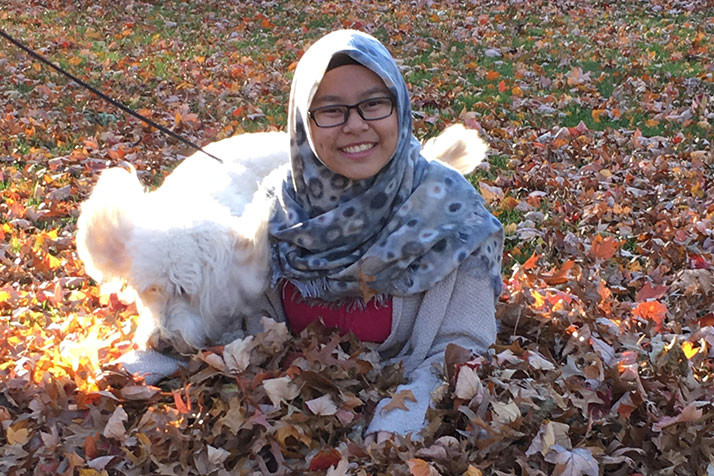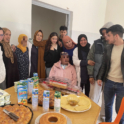Maryame has taken the lessons learned from her exchange year to make a difference in her community.
STORIES
Words of Hope

This article was written by Jay Senter and originally appeared in the Shawnee Mission Post. Photo by Leslie Marks.
Nurul Zamzami, YES 2016-2017, Indonesia, hosted by AFS in Mission Hills, KS
Coming to a country halfway around the world as an exchange student would be challenging enough for most young people. But coming from the largest Muslim country in the world to the United States during a period of unprecedented rancor over religious affiliation and national security has been especially confusing for one teen currently living with a host family in Mission Hills.
Nurul Zamzami came to the Kansas City area last year from her home in Indonesia on a scholarship through the Kennedy-Lugar Youth Exchange program. Just 4 percent of Indonesian applicants were approved for the award, which provides funding of around $22,000 for a year of study abroad.
Leslie Mark, Zamzami’s host mother, said the heated debate around the election proved especially stressful.
“The rhetoric in this country during and after the election regarding Islam has been a challenge for her and us,” Mark wrote.
But, Mark said, she was especially taken by a piece Zamzami recently wrote for the Pembroke Hill student magazine sharing her reflections on her stay in the United States to date, the first time in her life she had not been surrounded by fellow Muslims.
“In this strange and challenging time in our country, her words bring hope,” Mark said.
Zamzami’s article is republished below:
On Observance and Becoming A ‘Good’ Person
By Nurul Zamzami, AFS/YES Student [Indonesia] 2016-’17, Mission Hills, KS
Born and raised in Indonesia, I was used to a religiously homogeneous environment. There was not much diversity in my school since Muslims make up around 90 percent of the population. Although Indonesia is secular, religion has always been a predominant element in decision making by the government. Many parents send their children to religious boarding schools each year; others send their children to public schools where religious instruction is compulsory, but children study only on their own religion. Families regularly attend communal prayers, since observance and piety are considered benchmarks of morality. For years, I believed the notion taught by my teachers: One needs to be religiously observant to lead a good life, and only people who have lived a good life will be eternally rewarded with a heavenly afterlife.
The religious education I received taught me that one’s religion is either “right” or “wrong.” I believed only one religion could be the “correct” one since it’s impossible for other religions to hold various perceptions of God and also be “correct.” These teachings have perplexed me. What chances do Islam, Christianity, Judaism, Buddhism, or Confucianism have for being the right religion? What would happen if I were observant of a “wrong” religion? What chance at the afterlife would I have if I did not live according to the “correct” religion? I was raised in an environment that valued piety. I was already overwhelmed by these ideas regarding observance, and worried that I was not observant enough. Additionally, the concern that there might only be a slim possibility of finding the “correct” religion nearly forced me to give up faith altogether.
Before I had the chance to give up, it was time to leave for the United States. For the first time in my life, I live in a relatively diverse community. I stay with the Eisemann-Mark family, and I am discovering more about my own religion as I learn about their Jewish faith. We have long discussions, which have challenged my thoughts about religion and have made me look deeper into other religions (specifically Judaism). I have begun to realize that the point of religion is not merely afterlife. At its best, religion is a way of life. Religion should not demand people to focus on finding “the true God.” Instead, I believe religion should direct people to do good. When I view religion this way, I no longer worry about the right or wrong religion.
In the past five months, I have met people who are unaffiliated with religion, yet are no less moral than others who are religious. Religions may teach moral values, but a person does not need religion to be a moral person. Morality and religion simply do not determine each other.
Having been exposed to new religions has made me realize that there is much more to people than their view of God. As a person who was raised in a homogeneous community where people try to determine the quality of a person by their observance, I’m glad that I have learned to see beneath all the religious attributes that we portray. What I value in myself and others is no longer observance and piety, but rather sympathy, understanding, and respecting fellow human beings. To me, that is all that should matter.





